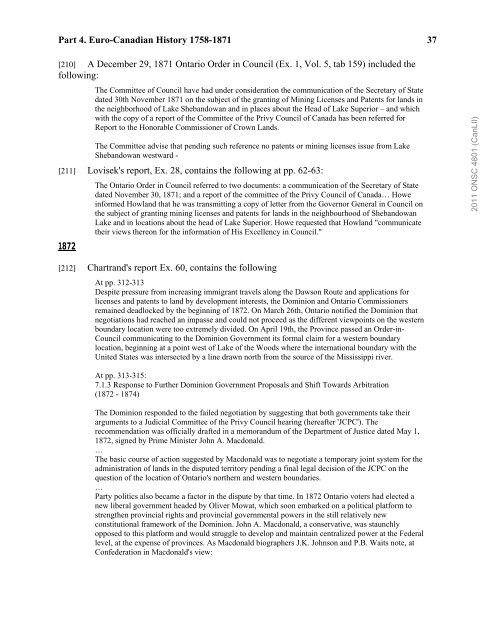Keewatin v. Minister of Natural Resources
Keewatin v. Minister of Natural Resources
Keewatin v. Minister of Natural Resources
- No tags were found...
Create successful ePaper yourself
Turn your PDF publications into a flip-book with our unique Google optimized e-Paper software.
Part 4. Euro-Canadian History 1758-1871 37[210] A December 29, 1871 Ontario Order in Council (Ex. 1, Vol. 5, tab 159) included thefollowing:The Committee <strong>of</strong> Council have had under consideration the communication <strong>of</strong> the Secretary <strong>of</strong> Statedated 30th November 1871 on the subject <strong>of</strong> the granting <strong>of</strong> Mining Licenses and Patents for lands inthe neighborhood <strong>of</strong> Lake Shebandowan and in places about the Head <strong>of</strong> Lake Superior – and whichwith the copy <strong>of</strong> a report <strong>of</strong> the Committee <strong>of</strong> the Privy Council <strong>of</strong> Canada has been referred forReport to the Honorable Commissioner <strong>of</strong> Crown Lands.The Committee advise that pending such reference no patents or mining licenses issue from LakeShebandowan westward -[211] Lovisek's report, Ex. 28, contains the following at pp. 62-63:1872The Ontario Order in Council referred to two documents: a communication <strong>of</strong> the Secretary <strong>of</strong> Statedated November 30, 1871; and a report <strong>of</strong> the committee <strong>of</strong> the Privy Council <strong>of</strong> Canada… Howeinformed Howland that he was transmitting a copy <strong>of</strong> letter from the Governor General in Council onthe subject <strong>of</strong> granting mining licenses and patents for lands in the neighbourhood <strong>of</strong> ShebandowanLake and in locations about the head <strong>of</strong> Lake Superior. Howe requested that Howland "communicatetheir views thereon for the information <strong>of</strong> His Excellency in Council."2011 ONSC 4801 (CanLII)[212] Chartrand's report Ex. 60, contains the followingAt pp. 312-313Despite pressure from increasing immigrant travels along the Dawson Route and applications forlicenses and patents to land by development interests, the Dominion and Ontario Commissionersremained deadlocked by the beginning <strong>of</strong> 1872. On March 26th, Ontario notified the Dominion thatnegotiations had reached an impasse and could not proceed as the different viewpoints on the westernboundary location were too extremely divided. On April 19th, the Province passed an Order-in-Council communicating to the Dominion Government its formal claim for a western boundarylocation, beginning at a point west <strong>of</strong> Lake <strong>of</strong> the Woods where the international boundary with theUnited States was intersected by a line drawn north from the source <strong>of</strong> the Mississippi river.At pp. 313-315:7.1.3 Response to Further Dominion Government Proposals and Shift Towards Arbitration(1872 - 1874)The Dominion responded to the failed negotiation by suggesting that both governments take theirarguments to a Judicial Committee <strong>of</strong> the Privy Council hearing (hereafter 'JCPC'). Therecommendation was <strong>of</strong>ficially drafted in a memorandum <strong>of</strong> the Department <strong>of</strong> Justice dated May 1,1872, signed by Prime <strong>Minister</strong> John A. Macdonald.…The basic course <strong>of</strong> action suggested by Macdonald was to negotiate a temporary joint system for theadministration <strong>of</strong> lands in the disputed territory pending a final legal decision <strong>of</strong> the JCPC on thequestion <strong>of</strong> the location <strong>of</strong> Ontario's northern and western boundaries.…Party politics also became a factor in the dispute by that time. In 1872 Ontario voters had elected anew liberal government headed by Oliver Mowat, which soon embarked on a political platform tostrengthen provincial rights and provincial governmental powers in the still relatively newconstitutional framework <strong>of</strong> the Dominion. John A. Macdonald, a conservative, was staunchlyopposed to this platform and would struggle to develop and maintain centralized power at the Federallevel, at the expense <strong>of</strong> provinces. As Macdonald biographers J.K. Johnson and P.B. Waits note, atConfederation in Macdonald's view:
















